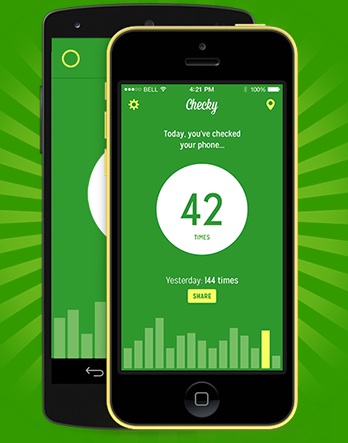 Time Magazine's post-Apple Watch cover story suggests that Apple might finally bring wearables into the mainstream in a way they've never been before -- and that this might not be a good thing.
Time Magazine's post-Apple Watch cover story suggests that Apple might finally bring wearables into the mainstream in a way they've never been before -- and that this might not be a good thing.
"Nobody anticipated the way iPhones exert a constant gravitational tug on our attention," Time's Lev Grossman and Matt Vela write. "Do I have e-mail? What’s happening on Twitter? Could I get away with playing Tiny Wings at this meeting? When you’re carrying a smartphone, your attention is never entirely undivided."
But help might come from an unexpected quarter: Developers are now turning to smartphone apps to solve the problem of people spending too much time on their smartphones. In fact there are now at least two apps for people who check their apps too much.
The newest one, Checky, is a simple application that tells users how many times they've checked their phone today, and maps out where they've checked it throughout the day. Another app, Moment, gives the amount of time the user has spent on his or her phone instead. While Checky is free, Moment is $4.99, but Moment does deliver some kind of an intervention, not just tracking: the app can alert you after you've spent a preset amount of time using your phone.
Both are self-tracking apps, but it's hard to classify them as health apps exactly. There are potential health, or at least wellbeing, risks associated with checking smartphones too often -- most obviously a condition recently christened "technological insomnia" which was detailed in a study in Nature last year. The study suggested that overexposure to artificial light from device screens, particularly when viewed right before bed, threw off circadian rhythms and made it harder for individuals to get to sleep.
 More generally though, persistent checking of email, Facebook, or the news can effect social relationships or contribute to some peoples' stress level. That's likely the impetus behind Checky, which is from the same developer as Calm.com, a meditation app and website. Checky serves as a sort of advertisement for Calm, and there's certainly a relationship between the two -- meditation requires being mentally focused and present, a state inconsistent with perpetually checking a bevy of apps.
More generally though, persistent checking of email, Facebook, or the news can effect social relationships or contribute to some peoples' stress level. That's likely the impetus behind Checky, which is from the same developer as Calm.com, a meditation app and website. Checky serves as a sort of advertisement for Calm, and there's certainly a relationship between the two -- meditation requires being mentally focused and present, a state inconsistent with perpetually checking a bevy of apps.
Apps like these two don't want to stop people from using their phones entirely, but by making them aware of how much they check their phones and how much time they spend on them, they create mindfulness and help people to limit their phone use to the level where they want it to be.
Health startups like Ginger.io already trade in on the idea that our phone usage itself can be an indicator of our health. By passively tracking how much a user calls, texts, and uses apps, Ginger.io attempts to create a profile of users, so the software can then highlight deviations from that profile that could signal mental illnesses like depression or even conditions like diabetes and Crohn's disease. These apps go a step further and suggest that reducing our phone usage, or at least being aware of it, could actually be key to better health.
If there are physical and social downsides to constant smartphone monitoring, most of the trends in wearables are only going to make them worse. Smartwatches like Apple's new offering and devices like Google Glass seek to make our devices even more constant and ubiquitous, and the trend in fitness tracking seems to be constant engagement, tracking movement during the day, sitting and standing at the office, and sleep at night, just to name a few.
In the new quantified self world, apps like Checky may just save us from ourselves -- or rather, from themselves.














